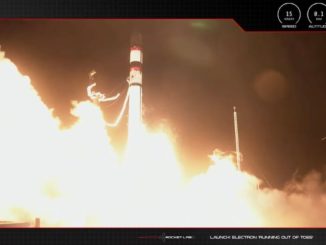China launched a Beidou navigation satellite Friday using a Long March 3C rocket, adding another node to a growing space-based network that Chinese officials say will broadcast positioning and timing signals around the world next year.
The Long March 3C launcher, fitted with a pair of liquid-fueled strap-on boosters, fired away from the Xichang space center at 1548 GMT (11:48 a.m. EDT) Friday, according to the China Academy of Launch Vehicle Technology, or CALT, the state-owned contractor that builds most Chinese satellite launchers.
The rocket arced toward the east-southeast from Xichang, an inland spaceport nestled amid mountains in southwest China’s Sichuan province. Liftoff occurred at 11:48 p.m. Beijing time.
The Long March 3C’s twin hydrazine-fueled boosters shut down and jettisoned around two minutes after liftoff, following moments later by separation of the rocket’s core stage.
Firings by the Long March 3C’s second stage, which also consumes hydrazine fuel, and the launcher’s cryogenic hydrogen-fueled third stage placed the mission’s Beidou satellite payload in an elliptical transfer orbit stretching roughly 22,000 miles (35,000 kilometers) above Earth.
Chinese officials declared the mission a success, according to a statement released by CALT. It was China’s eighth orbital launch attempt this year, seven of which have been successful.
Friday’s launch was the 27th space launch to successfully reach Earth orbit this year. Three additional launch attempts aiming for orbits around Earth have ended in failure, two using Iranian boosters and one with a Chinese rocket.
The Beidou navigation satellite launched Friday is heading for geostationary orbit more than 22,000 miles over the equator. The spacecraft’s on-board engine will circularize its orbit in the next few weeks.
The spacecraft was the 45th satellite launched for China’s Beidou network since 2000 — including prototypes no longer operational — and the second Beidou satellite China has sent into orbit so far this year. The Beidou project is China’s analog to the U.S. military’s Global Positioning System, and China says it will have enough satellites in orbit to begin providing worldwide navigation service next year, independent of the GPS fleet.
The Beidou system is already providing regional navigation service over the Asia-Pacific.
China’s state-run Xinhua news agency said earlier this year that eight to 10 Beidou satellites would be launched in 2019.
The next Chinese space launch is scheduled for Wednesday, according to aeronautical warning notices. A Long March rocket will place a Chinese payload, likely one or more military reconnaissance satellites, into a polar orbit from the Taiyuan space center in the northeast of the country.
Email the author.
Follow Stephen Clark on Twitter: @StephenClark1.



